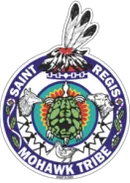Third Public Meeting Being Held June 13th at Diabetes Center, 6:00 p.m.
Akwesasne, NY — On Onerahtohkó:wa/May 28, 2016 the Saint Regis Mohawk Tribal Council met with U.S. Congresswoman Elise Stefanik (NY-21) to discuss drug addiction and efforts to create a detox facility in the Akwesasne community. The discussion also touched upon federal resources being made available through the Comprehensive Opioid Abuse Reduction Act that passed the House of Representatives on May 12, 2016. The bill authorizes the appropriation of $103 million annually over the 2017-2021 period for the Department of Justice (DOJ) to make grants to state, local, and tribal governments for existing and new drug abuse programs, including residential substance abuse treatment.
“The community has asked for more comprehensive addiction services including detox, longer term treatment and extended after care beyond what is already provided. Recovery from addiction requires a continuum of care and treatment, and we cannot overstate the importance of the prevention services that we provide,” said Tribal Chief Beverly Cook. “It’s a priority for the Tribal Council and we hope that with the assistance of Congresswoman Stefanik we’ll be able to access federal funding to help individuals and families who are suffering from addiction.”
On April 11th and May 9th, the Tribe hosted public meetings to have an open discussion and to seek the community’s input on the issue of drug addiction. Community members overwhelmingly expressed the need to develop plans that will help people who are being impacted by drugs, which includes the establishment of a detox facility based in Akwesasne. As a result, the Tribal Council has been identifying possible funding sources that will support a 24-hour treatment facility equipped with staff trained in administering culturally appropriate treatment.
“Developing and locating funding to support an ‘around-the-clock’ treatment facility takes time,” stated Tribal Chief Ron LaFrance Jr. “We want to ensure that the treatment provided takes into account not just the individual, but also the support network they will have on their path to recovery—their families and friends. The most successful treatment for a patient is a holistic treatment.”
While a local detox facility is in development, the Tribe’s Health Services has been having discussions with nearby drug addiction treatment centers on rehabilitation services. Efforts are still ongoing, but the Tribe is hopeful that with Congresswoman Stefanik’s support it will be able to secure services at the Canton-Potsdam Hospital in Potsdam, NY to help community members. For more information, a representative will be in attendance at the next public meeting on June 13th to discuss the hospital’s detoxification program.
“Drug addiction knows no boundaries, so its treatment needs to take a cooperative approach to address its impact on community members,” said Tribal Chief Eric Thompson. “Funding for addiction recovery centers situated in Native communities also need to be flexible and enable cultural elements to be incorporated into treatment programs. In our discussion with Congresswoman Stefanik, we requested the New York congressional delegation’s support for the Tribe’s efforts to create a culturally based recovery program.”
The meeting concluded with the Tribal Council providing Congresswoman Stefanik with a picture made by local Akwesasne artist Tehaweiakaron Jordan Thompson. Titled “Native American Veterans Dedication (2013),” it was presented for her assistance in bestowing congressional medals upon the Akwesasne Mohawk Code Talkers on the same day.
The third public meeting to discuss drug addiction and a detox facility will be held on June 13th, 6:00 p.m. at the Diabetes Center for Excellence. Refreshments will be available, including pizza, so please invite your family and friends, as well as youth.
# # # #
Please direct media inquiries to the Communications Department at (518) 358-2272 or email communications@srmt-nsn.gov .

